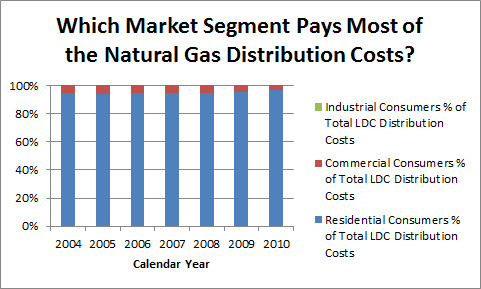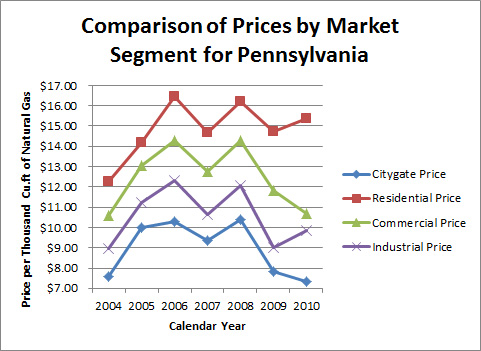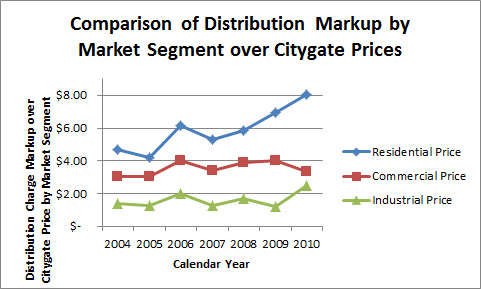RecoverIRô Blog
Discussion of Discovery & Recovery of Lost Energy
Are the Bill Paying Electricity and Natural Gas Residential Customers in Pennsylvania being Cheated?
Published by R. G. Lucas in Mis-Allocated Distribution Cost • 2/23/2011 4:47:24 PM
The U.S. Department of Energy's, Energy Information Agency (EIA) shows there are about 2.6 million residential natural gas (NG) customers, about 230,000 commercial NG customers, and about 5,000 industrial customers in Pennsylvania; yet the residential NG consumers in Pennsylvania are paying over 96% of the distribution cost markups over the citygate prices.

When comparing the prices per thousand cu.ft. of natural gas for each category of customer in Pennsylvania, clearly the residential customers are paying a much higher price than the commercial and industrial customers.

If we subtract the variable cost of the price of natural gas at the citygate, from each of the prices, it is very easy to see residential customers have experienced an increase in their markup for every thousand cu.ft. of natural gas used, while the increases to the commercial and industrial customers have been virtually zero and small, respectively.

When you combine this information about Pennsylvania with an estimated average annual residential natural gas bill of $1,600 per year. The total financial markup paid by the consumers of Pennsylvania come to a whopping, $909.8 millon per year (nearly $1 billon in Pennsylvania in disproportionate increases in the markups).
If only half of this $909.8 millon per year was allocated to theft, this $454.9 million per year would pay for the natural gas use of more than 280,000 homes in the state of Pennsylvania per year! This would be the equivalent of providing heating assistance for more than 10% of the residences using natural gas or it could highlight the potential that the bill paying customers are unknowingly paying for as much as 10% of the residences in Pennsylvania operating as energy thieves.
Perhaps it is time to figure out why the residential NG consumers in Pennsylvania are paying more each year for distribution. Is it time to find out how many NG thieves are operating in Pennsylvania.
Please, tell us what you think! If you would like a similar calculation for your state, please let us know.


When comparing the prices per thousand cu.ft. of natural gas for each category of customer in Pennsylvania, clearly the residential customers are paying a much higher price than the commercial and industrial customers.

If we subtract the variable cost of the price of natural gas at the citygate, from each of the prices, it is very easy to see residential customers have experienced an increase in their markup for every thousand cu.ft. of natural gas used, while the increases to the commercial and industrial customers have been virtually zero and small, respectively.

When you combine this information about Pennsylvania with an estimated average annual residential natural gas bill of $1,600 per year. The total financial markup paid by the consumers of Pennsylvania come to a whopping, $909.8 millon per year (nearly $1 billon in Pennsylvania in disproportionate increases in the markups).
If only half of this $909.8 millon per year was allocated to theft, this $454.9 million per year would pay for the natural gas use of more than 280,000 homes in the state of Pennsylvania per year! This would be the equivalent of providing heating assistance for more than 10% of the residences using natural gas or it could highlight the potential that the bill paying customers are unknowingly paying for as much as 10% of the residences in Pennsylvania operating as energy thieves.
Perhaps it is time to figure out why the residential NG consumers in Pennsylvania are paying more each year for distribution. Is it time to find out how many NG thieves are operating in Pennsylvania.
Please, tell us what you think! If you would like a similar calculation for your state, please let us know.
Natural Gas Fires Cost Cities a Lot More than the Cost of Gas
Published by From "The Morning Call" in News • 2/16/2011 10:12:04 PM
"The massive emergency response to last week's deadly natural gas explosion in Allentown cost nearly $61,000, according to city figures released Wednesday, though the true financial toll of the blast may not be known for some time.
Mayor Ed Pawlowski said he met with UGI Utilities and the company paid $50,000 toward the city's costs. UGI spokesman David Beard said the company will consider paying more as the city compiles a more complete list of expenses.
Nearly half of the cost comes out of the fire department, which spent an estimated $25,341 battling the gas-fueled blaze throughout the night of Feb 9-10. Fire Chief Robert Scheirer said 30 men were on duty and an additional 20 men were hired to help. In all, 55 Allentown fire personnel worked the scene" (By Christopher Baxter, OF THE MORNING CALL Allentown, PA)
Mayor Ed Pawlowski said he met with UGI Utilities and the company paid $50,000 toward the city's costs. UGI spokesman David Beard said the company will consider paying more as the city compiles a more complete list of expenses.
Nearly half of the cost comes out of the fire department, which spent an estimated $25,341 battling the gas-fueled blaze throughout the night of Feb 9-10. Fire Chief Robert Scheirer said 30 men were on duty and an additional 20 men were hired to help. In all, 55 Allentown fire personnel worked the scene" (By Christopher Baxter, OF THE MORNING CALL Allentown, PA)
If One Man in Wyoming Can Steal $10,000, How Many Others are Still Out There?
Published by R. G. Lucas in Convicted Energy Thieves • 2/15/2011 10:38:08 PM
Wyoming;s state average poverty level is only about 1.1%, yet this energy theft occured in an urban area in Wyoming.
If this person was stealing natural gas for five years, who was looking for the energy thieves and how effect were their efforts.
Prepaid Smart-Meters for Energy Thieves Could Cut Costs of Bill Paying Customers and Increase Safety
Published by R. G. Lucas in Energy Theft • 2/1/2011 11:58:36 AM
Based upon RecoverIR discussions within the last 6 months with many electric utilities and many natural gas local distribution companies, several common threads seems to be emerging which could be significantly mitigated if electric and gas utilities simply began to install prepaid meters similar to those of First Choice.
Recent posts
Does a Big DOE Loan Guarantee Lower Investor/Owner Solar Investment Risk?Landlord charged with tapping UGI lines, stealing gas
What will Happen to Natural Gas Prices in Ohio when the OCC's Budget is Cut in Half
Two Metrics to Monitor the President's Weatherization Assistance Program Waste
Are the Bill Paying Electricity and Natural Gas Residential Customers in Pennsylvania being Cheated?
All the posts...